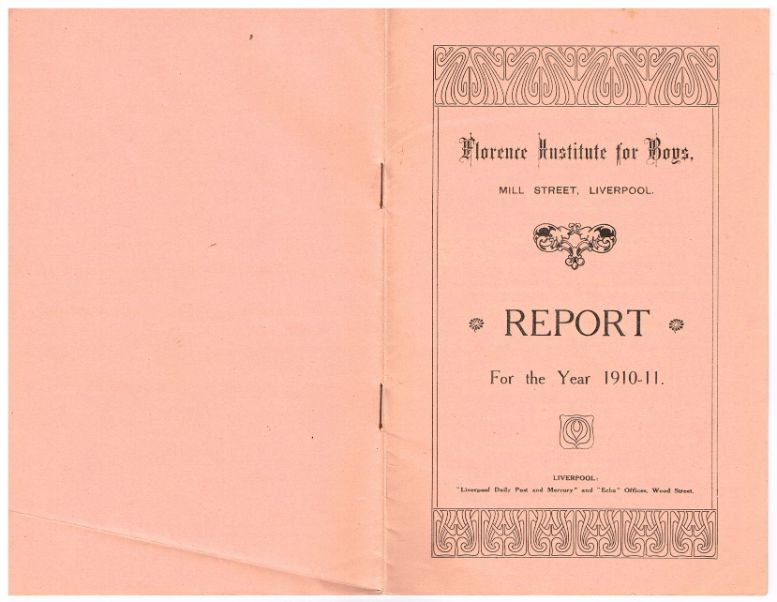
1910
The Florence Institute was open 154 times this year, with an average monthly membership of 341.
This year saw the introduction of the index card method of registration, and the purchase of a much sought-after billiard table. In addition, the Lending Library was now open two nights a week. Modelled on the public library, it operated in a more causal way to encourage members to feel comfortable and use it, with positive results: ‘besides being convenient, makes it easy for the boys to avail themselves of the Free Libraries without being frightened off by supposed formalities, as is apt to happen. The treatment of the books has been on the whole good.’
Sports continued to be popular, and the Gymnasium team won the Temple Shield for the 2nd time in the Institute’s history. The Institute planned to hold sports activities during the summer in order to ‘keep members together’ and thanked the Committee of the Domestic Mission for the use of their field in Aigburth Vale. In football, ‘Florence Albion (although not actually one of the Florence teams) have won Third Division cup and gold medals of the I Zingari League.’
After their heyday, it was reported that entertainments at the Institute would have incurred a loss this year if not for a donation: ‘This financial condition was partly due to the result of efforts on the part of the Entertainment Committee to raise the standard and tone of entertainment and partly due to the competition of picturedromes and other places of entertainment springing up in our neighbourhood.’ Yet all was not lost: ‘A very pleasing fact is that many ‘Old Boys’ are now in such positions that they are able to support the Institute financially.’
The Florence Institute News
1st January 1910
The first edition of the new decade begans with news of the 1st Cadet Battalion The King’s (Liverpool Regiment) ‘B’ Company (Florence Institute Detachment), which dominated the front page of the newsletter . In a lengthy article written by ‘an Officer’, who had ‘great hopes and many ambitions for the future..’. In expressing the importance of regular attendance at Drill, the Officer concedes that being kept late at work and attending Night School might keep even the keenest cadet from parade, but ‘On the other hand there are some Cadets who could turn up more regularly than they do if they really cared to do so.’ He announces ‘a most full and varied programme of training before us’ , which includes the prospect of ‘exciting contests’ for prizes such as ‘best dressed N.C.O’ and marching. The Company will March Out regularly throughout the neighbourhood, alongside practising tactical exercises and manoeuvres in local parks. Company ‘sing songs’ will become a regular institution, and ‘it is hoped that Bayonet Exercises and Single Stick fencing will form part of the Company work.’ Vital to the success of the Company is a belief that they can be ‘the best military organisation of its kind in Liverpool’ and make the words of their song ring true ‘You’d go far to see (yes very far indeed)! A smarter or trimer Cadet Company!’
Next, there were some harsh words against the Gymnasium’s recent performance against Colosseum, which caused a great deal of anxiety for spectators, who asked ‘why didn’t we charge extra for the nerve tonic’ ! The anonymous reporter asked: ‘Where has your style gone to, or in other words SWANK? Surely, to goodness Stylish work does not cost much more energy than slovenly work, and yet style is one of the most important points in Gymnastics, and again, what on earth is the use of trying to do trick or combination if you only half do it?’ The chastisement continued, with a letter by the Superintendent criticising members of the Orchestra with a rather serious warning: ’ Now boys, let this slackness stop, you have a good Instructor, plenty of good music and a good room to practice I, therefore, don’t neglect to avail yourselves of the best opportunity you ever had or ever will have.’ Praise was given to competitors in the Bagatelle League (perhaps because the Superintendent was a member of the League himself) and the popular Florence Minstrels, who performed at Smithdown Road Workhouse, ‘’not to stop’ but to brighten the lives of the inmates many of whom are there through no fault of their own and deserve our sympathy and help.’
Finally, an entertaining account of a summer spent touring North Wales by bicycle was submitted by the curiously named ‘Insomnia’. Tales of camping, cooking and bathing in less-than-perfect conditions are humorously recounted by the writer, who had to endure freezing waters ‘Steble Street at its worst a warm bath in comparison’, greedy camp-mates ‘we called him a gormandizing unit of the porcine tribe in a more direct and less polished manner than here related’ and the unwanted attention of an angry Welsh farmer, ‘He informed us in a few well chosen sentences, literally besprinkled with adjectives of a picturesque nature, that we were not burdened with an extraordinary amount of modesty, and that the sooner we got outside his field the better pleased he would be. He was a big brawny fellow, and he carried a stout ash-plant and swore rather better than most Welshmen, so we deemed it expedient to get a move on to avoid complications; and we wasted no time in packing up.’
THE FLORENCE INSTITUTE
- 0151 728 2323
- info@theflorrie.org
- 377 Mill Street, L8 4RF
- We are open: 9am – 6pm Monday to Friday.
Registered Office: The Florence Institute Trust Ltd, 377 Mill Street, Liverpool L8 4RF. Charity Registration No: 1109301. Company Registration No: 05330850 (registered in England and Wales).
